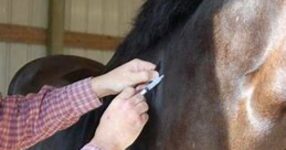
State says horse owners should vaccinate animals for mosquito-borne disease
The state this week announced the first known case of a co-infection of mosquito-borne disease in a horse in Maine.
The Department of Agriculture said the horse tested positive for EEE and West Nile Virus and had to be euthanized due to the severity of its illness.
Maine State Veterinarian Dr. Stefanie Bolas said horses, like humans, can be become sickened by mosquito borne illness.
“Horses are a dead-end species. When they are infected, they are not a risk to other horses or humans. I think that’s an important point to make. While they are susceptible, they are not a risk to other horses or people,” Bolas said.
Bolas said that horse owners should consider vaccinating them for EEE and West Nile virus if they haven’t already. Or give them a booster if they were vaccinated in the spring.
The state reports EEE in eight horses, three wild birds, two emus, one llama, and WNV in 33 wild birds, one alpaca, and two people.
Bolas specialty livestock, such as emu’s and ostriches, should be vaccinated if possible.
“While vaccination is officially labeled for use in horses we do recommend talking to vets about off label use of these vaccines. They [specialty livestock] are very susceptible to these viruses and unfortunately many do pass away,” Bolas said.
Any suspicion or confirmation of disease should be reported to the state Division of Animal Health.
Thirteen of Maine’s 16 counties have now reported mosquito-borne disease activity this season.
To mitigate the risk of mosquito bites, the state recommends removing or changing out in water troughs and wheelbarrows; using insect repellent that is safe for animals; and limiting outdoor activity at dawn and dusk when mosquitoes are most active.
The Maine CDC said there have been no reported cases of co-infection of humans in Maine, but EEE, WNV, and Jamestown Canyon Virus all pose a risk to humans.



